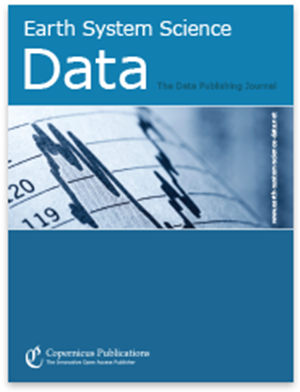EPCAPE 运动期间对海洋云层的多频雷达观测
IF 11.6
1区 地球科学
Q1 GEOSCIENCES, MULTIDISCIPLINARY
引用次数: 0
摘要
摘要东太平洋云雾气溶胶降水实验(EPCAPE)是美国能源部在美国加利福尼亚州拉霍亚斯克里普斯海洋学研究所开展的一项全年活动,重点是描述沿海地区的大气过程特征。喷气推进实验室开发的新型 Ka 波段、W 波段和 G 波段(35.75、94.88 和 238.8 千兆赫)剖面大气雷达(名为 CloudCube)的地基原型参与了 2023 年 3 月和 4 月为期 6 周的实验。本文介绍了在实地活动期间从各种海洋云层和小降水中获得的独特数据集。据作者所知,这是首次使用包括 238.8 GHz 在内的多频同步测量对大气云层进行观测。因此,这些数据集为研究和分析直径在毫米和亚毫米范围内的水介质提供了难得的机会,可用于更好地了解云和降水的结构、形成和演变。本文引用的数据集旨在以多普勒光谱和多普勒矩的形式提供完整、广泛和高质量的 G 波段数据集。此外,还包括 6 个不同天的 Ka 波段和 W 波段反射率以及 Ka、W 和 G 波段反射率比剖面图。数据集见 https://doi.org/10.5281/zenodo.10076227(Socuellamos 等,2024 年)。本文章由计算机程序翻译,如有差异,请以英文原文为准。
Multifrequency radar observations of marine clouds during the EPCAPE campaign
Abstract. The Eastern Pacific Cloud Aerosol Precipitation Experiment (EPCAPE) was a year-round campaign conducted by the US Department of Energy at the Scripps Institution of Oceanography in La Jolla, CA, USA, with a focus on characterizing atmospheric processes at a coastal location. The ground-based prototype of a new Ka-, W-, and G-band (35.75, 94.88, and 238.8 GHz) profiling atmospheric radar, named CloudCube, which was developed at the Jet Propulsion Laboratory, took part in the experiment during 6 weeks in March and April 2023. This article describes the unique data sets that were obtained during the field campaign from a variety of marine clouds and light precipitation. These are, to the best of the authors' knowledge, the first observations of atmospheric clouds using simultaneous multifrequency measurements including 238.8 GHz. These data sets therefore provide an exceptional opportunity to study and analyze hydrometeors with diameters in the millimeter- and submillimeter size range that can be used to better understand cloud and precipitation structure, formation, and evolution. The data sets referenced in this article are intended to provide a complete, extensive, and high-quality collection of G-band data in the form of Doppler spectra and Doppler moments. In addition, Ka-band and W-band reflectivity and Ka-, W-, and G-band reflectivity ratio profiles are included for several cases of interest on 6 different days. The data sets can be found at https://doi.org/10.5281/zenodo.10076227 (Socuellamos et al., 2024).
求助全文
通过发布文献求助,成功后即可免费获取论文全文。
去求助
来源期刊

Earth System Science Data
GEOSCIENCES, MULTIDISCIPLINARYMETEOROLOGY-METEOROLOGY & ATMOSPHERIC SCIENCES
CiteScore
18.00
自引率
5.30%
发文量
231
审稿时长
35 weeks
期刊介绍:
Earth System Science Data (ESSD) is an international, interdisciplinary journal that publishes articles on original research data in order to promote the reuse of high-quality data in the field of Earth system sciences. The journal welcomes submissions of original data or data collections that meet the required quality standards and have the potential to contribute to the goals of the journal. It includes sections dedicated to regular-length articles, brief communications (such as updates to existing data sets), commentaries, review articles, and special issues. ESSD is abstracted and indexed in several databases, including Science Citation Index Expanded, Current Contents/PCE, Scopus, ADS, CLOCKSS, CNKI, DOAJ, EBSCO, Gale/Cengage, GoOA (CAS), and Google Scholar, among others.
 求助内容:
求助内容: 应助结果提醒方式:
应助结果提醒方式:


